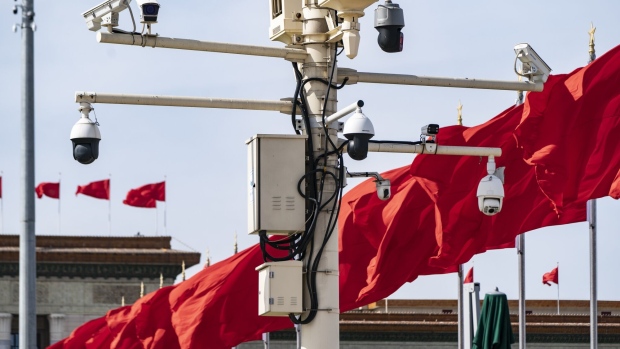Oct 19, 2023
China Charges Japanese Executive Detained For Spying, Kyodo Says
, Bloomberg News

(Bloomberg) -- A Japanese pharmaceutical company executive who was detained in Beijing on allegations of espionage has been formally charged, escalating a problem that has damaged ties between the two Asian neighbors and hit investor confidence in China.
Japan’s Chief Cabinet Secretary Hirokazu Matsuno confirmed the indictment had taken place in mid-October in a briefing in Tokyo on Thursday.
“We are strongly pushing the Chinese side at various levels for his early release and we will continue these efforts,” he said, adding that the government would offer all possible support.
The employee of Astellas Pharma Inc., who has been named by the Wall Street Journal as Hiroshi Nishiyama, was detained in March. He is in his 50s and, according to Japanese media, had worked in China for more than 20 years.
China’s ambassador to Tokyo has said the case is related to espionage and his country’s national security.
A spokesperson for Astellas declined to comment on the news. The indictment came about a week after China released Australian journalist Cheng Lei. She told Sky News she had been detained for three years after sharing a government document minutes before it was released.
Read more: Most Japanese Companies Pessimistic on China’s Economy
The indictment is one of a number of recent issues that have damaged ties between Japan and China, Tokyo’s biggest trading partner. China has expressed outrage over Japan’s release of treated nuclear wastewater into the Pacific Ocean, and sees Tokyo’s bolstering of military ties with the US, South Korea and other partners as an attempt to encircle China.
Tokyo also signed a Group of Seven statement in May that emphasized economic security through “de-risking” — a policy seen by Beijing as aimed at containing China’s development. In July, Japan stepped up oversight of exports of technology used to make high-end semiconductors.
Read more: China’s Fury Over Fukushima Water Casts Pall on Asean Forum
China banned imports of seafood from Japan in August over the water issue and has continued to send coast guard vessels into part of the East China Sea that is controlled by Japan but claimed by China, inflaming tensions.
Yet the two governments have maintained some lines of communication. Foreign ministry officials from Japan, China and South Korea agreed at a Sept. 26 meeting to hold a trilateral summit at the earliest convenient time.
The news of the indictment broke as the Tokyo-Beijing Forum was taking place in Beijing. The forum is an annual event between the two nations, to which Japan’s Prime Minister Fumio Kishida and the foreign ministers of both nations sent greetings this year.
“Japanese companies want to expand but are also somewhat cautious,” Takehiko Nakao, chairman of Mizuho Research & Technologies, said at the forum.
Nakao, who previously ran the Asian Development Bank and served as a top Japanese finance ministry official, said the caution was partly due to the anti-espionage law and also the detention of the executive which the Chinese government never explained. “If there’s even one person like that people become very worried,” he said.
Seventeen Japanese have been detained in China since May 2015, the foreign ministry said in a Sept. 26 email. Of those, 11 have returned to Japan and one has died. Among the remaining five, one is in detention, two are serving sentences and two are undergoing trial. China introduced anti-espionage legislation in 2014, which was expanded in July.
(Updates with comments from former ADB chief)
©2023 Bloomberg L.P.





